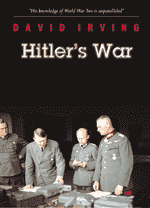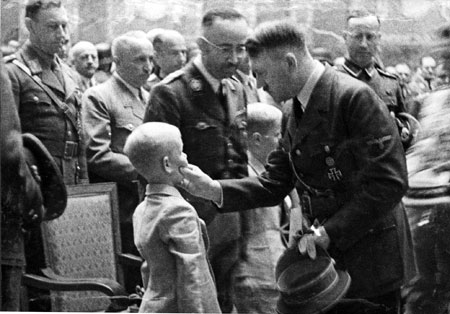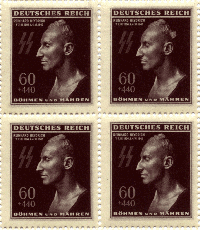| |||||
| |||||
Unless correspondents ask us not to, this Website will post selected letters that it receives and invite open debate. |
Tom Strasnov tells Mr Irving, Sunday, October 16, 2005, that Polish cavalry did not attack tanks with lances, and he has got it all wrong about Heydrich's popularity with the Czechs too.

 Polish
cavalry did not attack tanks with lances
Polish
cavalry did not attack tanks with lances
David Irving: "Hitler's War" (Millennium Edition, 2002)
AFTER reading roughly half of your book so far I'm pretty impressed with the exception on two points:
- On page 225 you state: "Apparently convinced that the German tanks were only tinplate dummies, the Polish cavalry had attacked with lances couched."
Now that is a total myth; the whole story is well documented, among others, here [hyperlinks supplied by this correspondent]:
The battle of Krojanty During the action the Polish cavalry units met a large group of German infantry resting in a woods near the village of Krojanty. Colonel Mastalerz decided to take the enemy by surprise and immediately ordered a cavalry charge, a tactics the Polish cavalry did not use as their main weapon. The charge was successful and the German infantry unit was dispersed and the Poles occupied the woods. Moreover, the German advance was stopped for enough time to allow the withdrawal of Polish 1st Rifle battalion and National Defence battalion Czersk from the area of Chojnice. However, the sounds of the battle notified the crews of the APCs stationed nearby and soon the Polish unit got under heavy machine gun fire. According to Heinz Guderian's memoirs, the Polish cavalry charge impressed the Germans and caused a widespread panic among the soldiers and the staff of German 20th Motorised Infantry Division, which delayed their offensive and forced them to consider a tactical retreat. This was however prevented by personal intervention of Gen. Guderian. Aftermath and the myth The Polish cavalry charge stopped the German pursuit and the units of Czersk Operational Group were able to withdraw southwards unopposed. Also, it took the enemy several hours to reorganise and continue the advance. On September 2, 1939, the 18th Pomeranian Uhlans Regiment was decorated by Gen. Grzmot-Skotnicki, the commander of the Operational Group, with his own Virtuti Militari medal for valour shown in this combat. The same day the German war correspondents were brought to the battlefield together with two journalists from Italy. They were shown the battlefield, the corpses of Polish cavalrymen and their horses, as well as German tanks that arrived to the place after the battle. One of the Italian correspondents sent home an article, in which he described the bravery and heroism of Polish soldiers, who charged German tanks with sabres and lances. Although such a charge did not happen and there were no tanks used during the combat, the myth was used by German propaganda during the war. After the end of World War II it was still used by Soviet propaganda as an example of stupidity of Polish commanders, who allegedly did not prepare their country for the war and instead wasted the blood of their soldiers. "Contrary to German and Italian propaganda, Polish cavalry brigades never charged tanks with their sabres or lances as they were equipped with anti-tank weapons such as 37mm Bofors wz.36 (exported to UK as Ordnance Q.F. 37mm Mk I) anti-tank guns, that could penetrate 26mm armour at 600m at 30 degrees. The cavalry brigades were in the process of being reorganized into motorized brigades". Another weapon was anti-tank rifle model 1935 (karabin przeciwpancerny wz. 35). Its calibre was 7.92 mm and it could penetrate 15mm armour at 300m at 30 degrees. |
Basically the whole of page 163: "Surprisingly, the "protectorate" brought blessings for the Czechs as well. Their economy was stabilised and unemployment vanished. Their menfolk were not called upon to bear arms in Hitler's coalition. Their armed forces were dissolved, and their officers were given state pensions on Hitler's orders, to purchase their dependence on complicity. The industrious Czechs accepted rich contracts from the Reich and learned eventually to cherish the pax teutonica enforced by Reinhard Heydrich in 1941. It was the peace of the graveyard, but Heydrich won the affection of the Czech workers to such an extend - for instance, by introducing the first ever Bismarckian social security and pension schemes - that 30,000 Czechs thronged into Wenceslas Square in Prague to demonstrate against his murder in 1942. Hácha himself never felt any grievance....he would die, forgotten, in an Allied prison in 1945...."
I happen to know a bit more on the subject because I've been preparing my book about the Munich Crisis 1938 for about ten years now and also because I was born Czech myself. Let me just state that you could hardly find any Czech of the time who would call living in the Protectorate a "blessing". That might have been true at first with moderate Neurath being the Protector and with his restraint against the local population. He even conversed in French with General Syrovy, the first Protectorate prime minister.

But the moment Heydrich appeared - everything turned into the living hell. Night house to house searches, summary executions, decimation of the local resistance movement. One could hardly call it a "blessing". It was widely thought, at least in London based on the coded radio messages, that after his assassination there could hardly be anybody else WORSE who would replace him as the Protektor.
Nor did the Czech rich ever accept the rich contracts from the Reich simply because there were none. The most important factories were annexed by "Goering Werke" outright, the less important ones germanized (management in German hands) and so the "rich" had no other option left but to sell everything off and emigrate, for instance just as Mr. Bata (shoe factories in city of Zlin) would.
The menfolk weren't called upon bearing arms in Wehrmacht for very simple reason, not because of Hitler benevolence but because they weren't trusted. Hitler, being well informed of the history, knew about thousands of soldiers who enlisted during WWI and were supposed to fight for the Austrian-Hungarian Empire. As it turned out they almost all switched sides - forming legions in Italy, France and Russia. At the end of WWI in Russia alone there were over 50,000 Czech legionnaires first fighting against Austrians and then against the Bolsheviks. The state pensions could hardly win their hearts over, as a matter of fact nucleus of the first underground and strongest resistance was formed ENTIRELY by the former Czech army officers. Their dislike of Germans, if not the hatred, persisted until the very end of the war.
After reading the page, one could think that Heydrich was just trying to look after the ordinary Czechs and simply do his job right as the "Protektor". It is true that the ordinary Czech factory workers were given (by Heidrich) extra ratios of food or sugar - provided they worked extra shifts and extra hard for the Reich. That was the one and only reason for that. One shouldn't confuse it for his soft heart or even slight hint of sympathy.

Picture (from David Irving's forthcoming Himmler biography) shows Adolf Hitler consoling the sons of Heydrich, Heider and Heino, at the state funeral in Berlin. Heider himself described to Mr Irving thirty years later the vast throngs of Prague citizens who lined Prague's Wenceslas Square, "the womenfolk wearing mourning clothes and carrying flowers" at the lying in state of his father. Below: Commemorative stamp issued, the death-mask of Heydrich.
Finally the claim that the thirty thousand Czechs therefore mourned his death in Prague is very unrealistic and untrue. There was a gathering of 300,000 people who answered Hácha's call for unity and showed up. Hácha was frankly told that this was the end of doing everything half heartedly and without enthusiasm.
 Either
they'd stick with Germans or they they would be dealth
with. What was meant by that was the forcible
expulsion of 5 million Czechs somewhere to the East.
That this was actually feasible. Hácha was
reapetadly assured and he himself had no illusions about it
either.
Either
they'd stick with Germans or they they would be dealth
with. What was meant by that was the forcible
expulsion of 5 million Czechs somewhere to the East.
That this was actually feasible. Hácha was
reapetadly assured and he himself had no illusions about it
either.
He had been in touch with the former Government's emigres in London and acted in sync with their decisions up until about 1941. He never condoned his signature of March 14/15, 1939, and only accepted it as a sacrifice for the sake of his nation.
Personally, however, he never lived in peace with it and when one listens to his speeches from 1939 compared to those in 1944 one can clearly hear why it took such a toll on this tragic man. He died in Prague's Pankrac prison, senile (could hardly answer questions as to what his name was etc.) and labeled as a Nazi collaborator. No doubt Benes would have had him hanged should he lived long enough to go to trial.
Rest assured, I'm looking forward to reading more pages of your interesting book though!
Tom Strasnov
- [Website note: We do not necessarily agree with opinions expressed by our correspondents]
![]()
 Free download of
David Irving: Hitler's War
Free download of
David Irving: Hitler's War Our dossier on
Reinhard Heydrich
Our dossier on
Reinhard Heydrich Oct 1941: Erklärung
des Stellvertretenden Reichsprotektors,
SS-Obergruppenführer Heydrich, gegenüber der
neu eingesetzten Protektoratsregierung
Oct 1941: Erklärung
des Stellvertretenden Reichsprotektors,
SS-Obergruppenführer Heydrich, gegenüber der
neu eingesetzten Protektoratsregierung Jun 9, 1942: Rede
des Reichsführers SS beim Staatsakt für SS-
Obergruppenführer Heydrich im Mosaiksaal der Neuen
Reichskanzlei am 9. Juni 1942
Jun 9, 1942: Rede
des Reichsführers SS beim Staatsakt für SS-
Obergruppenführer Heydrich im Mosaiksaal der Neuen
Reichskanzlei am 9. Juni 1942 How hated was Reinhard Heydrich in Prague? William
Blair argues that newsreel films of Heydrich funeral
proves Mr Irving did not get it all wrong about
Heydrich's popularity with the Czechs
How hated was Reinhard Heydrich in Prague? William
Blair argues that newsreel films of Heydrich funeral
proves Mr Irving did not get it all wrong about
Heydrich's popularity with the Czechs
Bookmark
the download page to find the latest new free
books